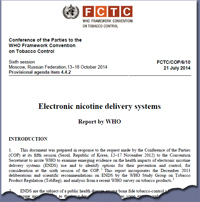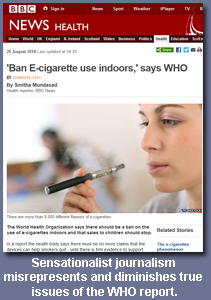 |
 |
|
The World Health Organization (WHO) has completed its review of the existing evidence around ENDS and published a paper for submission to the meeting of the Parties of the WHO Framework Convention on Tobacco Control, which occurs later this year. Electronic nicotine delivery systems (ENDS), of which electronic cigarettes are the most common prototype, are devices that do not burn or use tobacco leaves but instead vaporise a solution [containing nicotine] the user then inhales. Unsurprisingly, the UK did NOT respond to the WHO survey! Further, UK news broadcasters such as the BBC, once again use sensationalist and misleading journalism which misrepresents in this case, a detailed report by the World Health Organisation into e-cigarettes and other tobacco replacement nicotine delivery systems. The 23 page report, available from the E-Library Database, details the findings of the survey and examines the facts around the use of e-cigarettes, or Electronic Nicotine Delivery Systems (ENDS). Meanwhile in June, ASH (Action on Smoking and Health) campaign group updated their briefing on Electronic Cigarettes; again available from the E-Library Database. As to be expected, TV news and other media have concentrated on the conclusions which relate to forms of banning in the WHO report, as opposed to reporting accurately on the detail in the report, and the evidence base. Also as expected, those using e-cigarettes and the 'trendy' 'vaping' community have been completely aggressive in response to the report; in the same way as those questioning the safety of tobacco based cigarettes were demonised by smokers and the tobacco industry. It seems that the general consensus amongst those using e-cigarettes is, to hell with any scientific based studies into trying to determine the safety and effectiveness of e-cigarettes because they are all against the product anyway! E-cigarettes are better than tobacco cigarettes! Sadly, the trendiness, packaging, and ever increasing flavours of e-cigarettes seems to out way any common sense amongst the public. Even the attempts to protect children has been decried amongst claims that companies belonging to the ECITA trade body don't aim their products at children and so they can't possibly be a risk to children! The recommendations of the report go into detail and are not as bland as the media are making out, nor are they prohibitive of the sale and use of electronic nicotine delivery systems (ENDS) Page 11 of the report goes into detail of the reports recommendations aimed at the Parties of the WHO Framework Convention on Tobacco Control; and not as is inferred by the media, to governments and enforcing authorities. Here is a brief summary of the recommendations of the report: 40. Health claims. Prohibit manufacturers and third parties from making health claims for ENDS, including that ENDS are smoking cessation aids, until manufacturers provide convincing supporting scientific evidence and obtain regulatory approval. The regulatory standard for cessation claims and approval as cessation aids should remain an appropriate body of evidence, based on well-controlled clinical trials. 41. Use of ENDS in public places. ... ENDS users should be legally requested not to use ENDS indoors, especially where smoking is banned until exhaled vapour is proven to be not harmful to bystanders and reasonable evidence exists that smoke-free policy enforcement is not undermined.
Given that the same promotional elements that make ENDS attractive to adult smokers could also make them attractive to children and non-smokers, Parties should contemplate putting in place an effective restriction on ENDS advertising, promotion and sponsorship. Some forms of ENDS promotion, however, may be considered acceptable by Parties if empirical evidence shows that ENDS might play a role in helping some smokers to quit without leading to increased ENDS use by minors and non-smokers who otherwise would not have used nicotine. Any form of ENDS advertising, promotion and sponsorship must be regulated by an appropriate governmental body. If this is not possible, an outright ban on ENDS advertising, promotion and sponsorship is preferable to the implementation of voluntary codes on ENDS marketing, given the overwhelming evidence that similar codes for tobacco and alcohol products have failed to protect young people from such advertising. Advertising, promotion and sponsorship of ENDS with or without nicotine, must, at a minimum: (a) state clearly whether the product contains nicotine or may be used with nicotine solutions; 45. Advertising, promotion and sponsorship of ENDS that contain nicotine or may be used with nicotine solutions must: (a) clearly state the addictive nature of nicotine and that these products are intended to deliver nicotine; 47. Protection from vested commercial interests. Transparency should be required from ENDS and tobacco companies advocating for and against legislation and regulation, both directly and through third parties. No matter what role the tobacco industry plays in the production, distribution and sale of ENDS, this industry, its allies and front-groups can never be considered to be a legitimate public health partner or stakeholder while it continues to profit from tobacco and its products or represents the interests of the industry. 49. Health warnings. ENDS health warnings should be commensurate with proven health risks. In this regard, the following risk warnings could be considered: potential nicotine addiction; potential respiratory, eyes, nose and throat irritant effect; potential adverse effect on pregnancy (due to nicotine exposure). As can be seen from this excerpt, the media, and especially the BBC News; are selective in how they report this issue and in doing so negate the evidence and true intentions of the report as being a vehicle for further discussion, investigation and eventually specific recommendations aimed at government's and enforcing authorities. Source: WHO / Unionsafety See also: E-Ciggies Have No Place In The Workplace Says TUC As Government Move To License Them |

 42. Advertising, promotion and sponsorship.
42. Advertising, promotion and sponsorship.